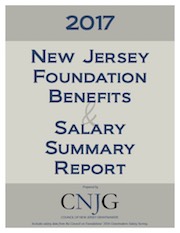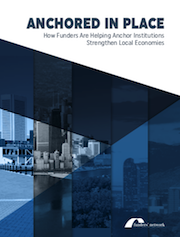All Funders
A CNJG member queried the Health & Aging listserves asking for sample letters of inquiry. This document includes a few responses from fellow members. If you would like to add yours to this list, please email us.
This research presents the first updated understanding of the current landscape of giving circles and similar models of collective giving or giving collaboratives in the United States in over 10 years.
Top 10 findings from a three-part study of giving circles, their impact and their relationship with their hosting organizations significantly updates our understanding of the current scope, scale and significance of giving circles and other models of collective giving in the U.S. Additionally, this study deepens our understanding of the impact of participation in giving circles on donors’ giving and civic engagement and offers actionable information related to the relationships between giving circles and their hosting organizations.

The 2017 New Jersey Foundation Benefits & Salary Report provides a valuable benchmarking resource. Developed and compiled for Council members exclusively, the report presents comprehensive benefits data specific to New Jersey's grantmaking community, alongside data from the Council on Foundations' annual salary survey.

This report by the Funders’ Network for Smart Growth and Livable Communities examines the potential of anchor institutions hold to create lasting and sustainable change—and illustrates how funders are working with anchor institutions to create healthier, more equitable, and economically vibrant places to live and work.
Evaluators, foundations and nonprofits need to examine the “fit” of our existing evaluation approaches with the principles and values that underlie grantmaking and efforts designed to advance equity.
For this suite of resources, GrantCraft captured the wisdom of philanthropic leaders who have participated in multi-party advocacy collaboratives and conducted a literature scan of how foundations talk about advocacy-focused collaborative work.
The William and Flora Hewlett Foundation has had a long-standing commitment to increasing the effectiveness of grantmaking organizations, a commitment reflected in its Philanthropy Grantmaking Program. In 2015, the Foundation commissioned Harder+Company Community Research, in partnership with Edge Research, to conduct a field scan to inform its own strategies in this area as well as those of other organizations working to increase philanthropic effectiveness.
These resources are from CNJG's 2016 Annual Meeting & Holiday Luncheon where the topic of shifting demographics was explored.
Philanthropy and the Social Economy: Blueprint 2017 is an annual industry forecast about the ways we use private resources for public benefit.
